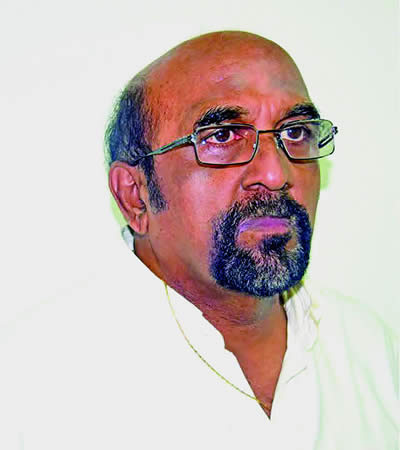

Statistics show that around 250,000 people suffer from diabetes while some 200,000 persons are at a pre-diabetic stage in Mauritius. Research conducted on an international scale has shown that diabetes and productivity have a direct link. Ranked 7th in the world for high prevalence, Mauritius is not spared either. It is an alarming situation indeed for a small island like ours where human resources play a vital role.
In Mauritius, the situation is disconcerting. According to the last study on non-communicable diseases and its risk factors (NCD Survey), it is estimated that 257,442 Mauritians aged between 25 and 74 (19.4% among adults) are diabetic. Adding to that the prevalence of pre-diabetic in Mauritius is also a major concern, representing a percentage of 22.8%. Accordingly, women are more prone to diabetes than men. Moreover, statistics reveal that around 398,417 Mauritians are either obese or overweight. From 1985 to 2000, prevalence increased by more than 200% (WHO estimates).
Concerning death, as per the latest WHO data published, death related to diabetes has reached 2,546, representing a percentage of 28.73%. Only in 2016, as per statistics of WHO, 1,270 people between the age of 30-69 lost their lives due to diabetes. Other statistics show that around 450 amputations are carried out yearly due to diabetes and some 1,500 persons with diabetes undergo dialysis.

The National Health Accounts Report 2017 also indicates that the country spent an estimated amount of Rs 16.5 billion on Non-Communicable Diseases, out of which, spending on cardiovascular diseases and diabetes were to the extent of Rs 3.57 billion and Rs 1.2 billion respectively.
Mauritius is already becoming an ageing population and the birth rate has decreased over the past years. Now with the increasing trend of diabetes, our human capital is at high risk. Will Mauritius begin to suffer from productivity?
Diabetes and productivity
Dr Iswaraj Ramracheya, Endocrinologist and Advisor at the Ministry of Health, highlights that nowadays, diabetes is very much common among the age group of 20 to 30 and this surely impacts our productivity and it represents an economic burden. According to the doctor, diabetes is directly linked to decrease in productivity in various ways. Firstly, he informs that with high blood sugar, it is difficult to concentrate and there is risk of further health complications. “With diabetes, there are high risks for micro vascular issues, high risk of cholesterol, which can eventually lead to stroke or heart attack. Besides, other complications include weak vision, loss of sensation, weak nerves and kidney damage. In this way, a person with uncontrolled diabetes cannot perform his job effectively, hence it affects productivity.”

Furthermore, Dr Ramracheya deplores that in a country with high prevalence of diabetes, the State invests massively in terms of medicines and treatment, which are expensive. This affects the economy as well.
Dr Veenoo Basant Rai, President of the Association of Diabetes, underscores that it is a tragedy for Mauritius to have such a high prevalence of diabetes and pre-diabetics. She claims that it is very unfortunate that diabetes is getting very much common in the age range of 20s and children as from the age of eight to nine as well. “Health is essential for everybody. Mauritius does not have natural resources. It has to be dependent of its human resources. So, the human resources are based on the health and wellness of the population. If the human capital itself starts facing complications, how can we expect them to be productive?”
She adds that half of the population is already facing complications, therefore, how can we expect the country to make progress? “We are in a crisis. Our progress is at stake. If we do not take necessary actions, it will be too late.”
Dr Tulsidas Naraidoo avers that the main concern is the percentage of absenteeism with diabetes. “Diabetes is more of a disease that could be prevented but due to food intake and alcohol consumption, people are getting prone to this disease. Diabetes is affecting all sectors of the country, especially the hotel industry. The case of diabetes promotes a decrease in productivity as people with diabetes often feel low, weak and hence cannot work properly.”

He further utters that during peak days or hours, there is always the risk of high absenteeism. “Various sectors need labour force but due to physical illness, labour is decreasing. Many qualified people are losing their life due to complications. If this trend continues, we will suffer badly and we will fall short of qualified human resources.”
Dr Aveeraj Peedoly confides that we are not aware of any official empirical study which has established and examined a link between diabetes and productivity in the context of Mauritius but a survey of literature on diabetes and productivity reveals that in many countries, where such studies have been conducted, there are such links which have been established and even measured. “For instance, according to The Economist Intelligence Unit (2015), total economic loss in companies in America, due to increased absenteeism, reduced productivity, inability to work and early mortality as a result of diabetes, amounts to $ 65.9 billion. In Canada, individuals with diabetes lose up to 5.4-18.1 days per year due to diabetes only. Total economic loss in companies in Singapore, due to reduced productivity as a result of diabetes, amounts to $ 524 million. Total economic loss in companies in Australia, due to early retirement, income taxation revenue, government welfare payments per year, as a result of diabetes amounts to $ 443.8 million. Besides, GDP of country is also affected. India currently bears the heaviest cost of productivity loss of approximately 2.1% loss in GDP due to diabetes.”
It is therefore safe to assume that diabetes impacts on productivity and in fact one of the fundamental reasons for engaging in such an initiative is to have a win-win-win situation where both employees, employers and collectively society as a whole stand to gain from combatting diabetes, highlights Dr Aveeraj Peedoly.
Professor Theeshan Bahorun, National Research and Innovation Chair and head of ANDI Centre of Excellence for Biomedical and Biomaterials Research, underlines that it is difficult to clearly ascertain how diabetes affects productivity and employment without detailed scientific studies. “This is why many countries with relatively high diabetes incidence are striving to undertake surveys on the impact of diabetes in workplace as part of their innovative endeavours to manage the consequences thereof. Such studies highlight that the majority of patients indicate that diabetes did not prevent them from completing important tasks. However, they also emphasize that diabetes sometimes prevented them from concentrating fully on their work. There are also indications that symptoms of diabetes such as giddiness, headache, and palpitations hindered their work and performance. A recent study conducted in Australia show that diabetes not only impacts productivity, but that it could be an enormous economic burden. This study was one of the first to quantify actual productivity losses associated with diabetes.”

With 23% of diabetes incidence and practically the same proportion of pre-diabetics, Mauritius may indeed face these problems in the mid-term and long run, he says. “Diabetes and its complications may prevent working entirely or increase absenteeism for those who work thereby posing a threat to productivity. The problem may turn out to be more complex as people with diabetes may face employment discrimination. There could, as shown elsewhere, especially because of the risk of hypoglycemia, employers may restrict access to jobs designated as safety sensitive or discriminate against individuals with diabetes because of their concerns about low productivity. A study found that diabetes had a profound negative effect on economic productivity due to early retirement, increased sick leaves, disability, and mortality.”
Why such a high prevalence?
Dr Iswaraj Ramracheya explains that there are two factors leading to such a high prevalence: modifiable and unmodifiable. He states that Mauritius is a mixture of different ethnicity and cultures, such as Asian and African, which are at high risk of getting diabetes. “We are a small country with many people of the same genes and the same genetic pool is increasing. Besides, another factor is family history. If diabetes runs in the family, it is a high risk for other family members as well.”
Concerning the modifiable factors, he underlines that the lifestyle and eating habits of Mauritians play a major role. “In Mauritius, we have noticed that people eat lots of food which are rich in carbohydrates, such as noodles and oily snacks. People eat too much fast food and fried stuff, hence putting themselves at high risk. But at the same time, people are less active.”

Dr Basant Rai argues that along with a needed change in lifestyle and culture, people currently are also living a very stressful life. “Stress is also predisposition factor for diabetes. The workforce today is over working from 8:00 am to 20:00 hours or even more. It is important to know how to plan your day to be able to live a healthy life. The most appropriate work life balance is eight hours of work, eight hours of other activities and eight hours of sleep. People who don’t follow a good work life balance are more at risk to develop chronic diseases.”
Fighting Diabetes at the Workplace
The Mauritius Research Council has come forward with a pilot Social Innovation Initiative known as “Fighting Diabetes at the Workplace’ (FDW).” Dr Aveeraj Peedoly from the MRC explains that the FDW is best seen as a socially innovative matching grant scheme accompanied by a pilot programme with the aim to incentivize interested large establishments to provide at workplace level, a comprehensive range of medical, educational and psychosocial support facilities to their employees to ensure systematic detection, follow-up and treatment of diabetic and pre-diabetic employees. “Subscribing enterprises are eligible for Rs 2.5 M on a matching-grant basis and the project is intended to run over 24 months. Four large establishments have subscribed to this programme thus far.”
The scale of the diabetes epidemic in Mauritius has become a major public health concern over the last couple of decades, with above 40% of Mauritians in the age-group 25-74 being either Diabetic or pre-diabetic, says Dr Peedoly. “Diabetes brings in its wake significant premature ill health and death due to the enormous burden associated with diabetic complications, including hypertension, heart and kidney disease. Yet, the fact that potent environmental and behavioural risk factors for Type 2 Diabetes such as obesity and exercise are modifiable, clearly indicates that there is merit in pursuing initiatives which transcend the curative and put at least equal emphasis on prevention while engineering health-conscious lifestyle transformations.”
He states that with FDW, the MRC wishes to bring its own contribution to the fight against diabetes to complement the services which are already being run by the Public Health System. “It is anticipated that the proposed use of an unconventional route that is the workplace, as a site for mobilizing and deploying resources and efforts - medical and psychosocial – to combat diabetes among workers, can potentially bring a significant difference in the fight against diabetes.”
The programme is also designed for beneficiaries to transmit, in turn, their newly available support framework and prescribed lifestyle changes to their significant others, that is immediate family and friends thus bringing about a positive multiplier effect to magnify the intervention from the workplace to the family and potentially to the community. Employers also stand to gain from this programme given that the efficiency, motivation and productivity of the employee are anticipated to be enhanced as a result of this initiative. The potential for up scalability of this programme once proven that it lives up to its promises is enormous.
Recommendations

Seeing the high prevalence of pre-diabetics in the country, Dr Iswaraj Ramracheya advises those in this stage to take many precautions so that they do not become diabetics. “Being a pre-diabetic is an eye opener indeed. To able to overcome this stage, it is important to eat healthy, less carbohydrates, more fruits and vegetables and a change in lifestyle. The same advice applies to diabetic people. If we are able to get a control over diabetes now, there will be obviously less complications in the future, diseases like heart attack can decrease as well. So, this might help us get a healthier population.”
For Dr Nariadoo, if companies want to be more productive and want healthy staff, it is high time, companies from different sectors dedicate one session to healthy living. “There should be an in house-training on health and wellness. Employees from top to bottom should be educated on how to eat and how to exercise properly. The same applies to schools where the children should be educated on healthy eating habits.”
Dr Basant Rai believes that it is high time for policy makers to come forward with intervention programmes as from birth. “It has now become important to equip parents with good parenting skills so that the upcoming generation does not fall prey to this disease. For instance, parents must be educated to keep their children from sugary food. Research have showed that these foods contribute to diabetes. Zero to eight years is a crucial phase of life, so parents must teach their children what and how to eat.”
Professor Theeshan Bahorun states that as till now, there is no systematic study in Mauritius answering the following question: Do individuals with diabetes have more time lost from work or more impaired time at work, and do they retire earlier than individuals without diabetes? Hence, he highlights that a Knowledge synthesis is needed regarding the effect of type 2 diabetes on a person’s ability to work so as to improve our understanding of the indirect impact of this chronic disease, to provide evidence for the importance of addressing its effects on the workforce, and to develop and implement sound interventions specifically designed for workers with diabetes. “We should perhaps start from there. In fact, with regards to the diabetes situation in Mauritius, there should have been a concerted research approach on diabetes targeting all aspects of this disease.
Research institutions, for instance, the MRC, should have coordinated applied research and development in this pertinent area to be consistent with their mandate and mission. It is now understood that this institution has currently other priorities. In my opinion, our policy makers should come up with a Mauritius National Diabetes Strategy with the aim and view to strengthening all sectors in developing, implementing and evaluating an integrated and coordinated approach for reducing the social, human and economic impact of diabetes in Mauritius.”

World Diabetes Day 2018-19
On the 14th November, the World Diabetes Day is celebrated. The theme for this year is The Family and Diabetes. A two-year timeframe has been chosen to best align the World Diabetes Day campaign to the current IDF strategic plan and facilitate planning, development, promotion and participation.
According to WHO, over 425 million people are currently living with diabetes. “Most of these cases are type 2 diabetes, which is largely preventable through regular physical activity, a healthy and balanced diet, and the promotion of healthy living environments. Families have a key role to play in addressing the modifiable risk factors for type 2 diabetes and must be provided with the education, resources and environments to live a healthy lifestyle.”
Activities being organized
To mark the World Diabetes Day, the following activities will be organized on 19th November:
- the official launching of World Diabetes Day 2018 on 19 November 2018 at the Octave Wiehé Auditorium, Réduit
- an exhibition on NCDs and other health related issues
- screening for the general public for risk factors of NCDs including diabetes; and
- sensitisation campaigns on the risks factors and prevention of diabetes.
 J'aime
J'aime













